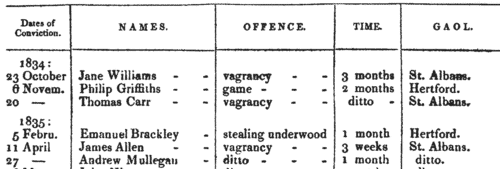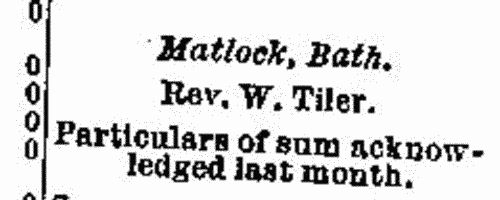Campkin Surname Ancestry ResultsOur indexes 1000-1999 include entries for the spelling 'campkin'. In the period you have requested, we have the following 43 records (displaying 11 to 20): Single Surname Subscription | | | Buying all 43 results of this search individually would cost £220.00. But you can have free access to all 43 records for a year, to view, to save and print, for £100. Save £120.00. More... |
These sample scans are from the original record. You will get scans of the full pages or articles where the surname you searched for has been found. Your web browser may prevent the sample windows from opening; in this case please change your browser settings to allow pop-up windows from this site. Minor offenders in Hertford
(1834-1835)
Justices of the Peace throughout England and Wales had the power of summary conviction for certain minor offences, principally vagrancy, poaching, petty theft, bastardy and assault. The magistrates' clerks for each district were required by Parliament to make a return of the names, offences, terms of imprisonment, and whether a written record was made of the proceedings, for the period from Michaelmas (29 September) 1834 to Michaelmas 1835. The return vary in completeness from magistrate to magistrate - the fullest returns also give the offender's address, the amount of fine or length of imprisonment, and/or the names of the justices. CAMPKIN. Cost: £6.00.  | Sample scan, click to enlarge

| Dissolutions of partnerships in England and Wales
(1847)
Perry's Bankrupt and Insolvent Gazette, issued monthly, included lists of dissolutions of partnerships gazetted in England and Wales. The names of the partners are given in full, surnames in capitals, followed by trade and address, and date of the end of the partnership. Each entry usually ends with the phrase 'Debts by ...', indicating which partner intended to continue, and resume the responsibilities of, the business. This is the index to the names of the partners, from the issues from January to December 1847.CAMPKIN. Cost: £6.00.  | Sample scan, click to enlarge

| Inhabitants of Leeds, Yorkshire
(1853)
William White's directory lists traders, farmers and private residents in the area. CAMPKIN. Cost: £6.00.  | Sample scan, click to enlarge

| Unclaimed Dividends
(1855)
The unclaimed dividend books of the Bank of England, containing names and descriptions of over 20,000 persons entitled to many millions of pounds accumulated in the bank unclaimed during the 18th and 19th centuries, mostly in consols and annuities, and transferred to the Commissioners for the Reduction of the National Debt.
CAMPKIN. Cost: £6.00.  | Sample scan, click to enlarge

| Gentry in London
(1856)
The Post Office London Directory for 1856 includes this 'Court Directory', listing alphabetically by surname and christian name the upper class residents of the capital with their postal addresses. 'In order to afford space for the addresses, the abbreviation "esq." for esquire has no longer been appended to each name in the Court Directory. It should be understood that such should be added to the name of every gentleman in the following pages to which no inconsistent addition is affixed.' Decorations, honours &c. are generally given. Some gentlemen appear who are also listed (as professional men, &c.) in the commercial section. Those with second residences in the provinces usually have the country address given as well.CAMPKIN. Cost: £4.00.  | Sample scan, click to enlarge

| Schoolmasters and trainees with Certificates of Merit
(1856)
The Committee of Council on Education for England and Wales produced an annual report which included several lists of teachers and trainee teachers, including an Annual Calendar of Teachers who have Obtained Certificates of Merit (completed to 1 January 1856), from which this sample scan is taken. The teachers are listed alphabetically by surname and initial, with name of school, post town or county, and grade, as either certificate or class. Student teachers were classed at the end of each year of training, so the column for class shows a student's class (1, 2 or 3) at the end of their first or second year of training. The teacher may then be awarded a certificate of merit by Her Majesty's Inspector, in which case the class and division of the certificate awarded appears in the columns for Certificate. No certificate of merit was granted a student, as a teacher, until he or she had been for two years in charge of the same elementary school, and the certificate was granted on the basis of two reports of performance as a teacher in school. If the first report was favourable, the teacher was paid for the first year on the scale of the lowest class; if the second report was favourable, augmentation and class of certificate was fixed for the next five years, after which (and so on from time to time) the certificates were open to revision. The value of the certificate, in the first instance, was not fixed higher than the first division of the third class, for any student who had resided less than two years at a training school under inspection. This is the index to the schoolmasters and male students in training schools. CAMPKIN. Cost: £6.00.  | Sample scan, click to enlarge

| Traders and professionals in London
(1856)
The Post Office London Directory for 1856 includes this 'Commercial and Professional Directory', recording over 100,000 individuals. CAMPKIN. Cost: £4.00.  | Sample scan, click to enlarge

|  Persons of standing recommending London police recruits
(1843-1857) Persons of standing recommending London police recruits
(1843-1857)
The Metropolitan Police Register of Joiners (MEPO 4/334) lists policemen joining the force 1 January 1843 to 1 April 1857 (warrant numbers 19893 to 35804). The register is alphabetical, in so far as the recruits are listed chronologically grouped under first letter of surname. It gives Date of Appointment, Name, Number of Warrant, Cause of Removal from Force (resigned, dismissed, promoted or died), and Date of Removal. Although the register was closed for new entrants at the end of 1842, the details of removals were always recorded, some being twenty or more years later. Those recruits not formerly in the police, the army, or some government department, were required to provide (normally) at least two letters of recommendation from persons of standing, and details of these are entered on the facing pages. Where a recruit was only recently arrived in the metropolis, the names and addresses of the recommenders can be invaluable for tracing where he came from. Those recruits not formerly in the police, the army, or some government department, were required to provide (normally) at least two letters of recommendation from persons of standing, and details of these are entered on the facing pages: the names in these are indexed here (the police recruits are indexed separately and not included here). Recruits transferred from other forces or rejoining the force did not normally need recommendations - in the latter case, former warrant numbers are given - but some recommendations are from police inspectors, even other constables. Recruits coming from the army sometimes have general military certificates of good conduct, but most often have a letter from their former commanding officer; recruits recommended by government departments (most often the Home Office) similarly have letters from the head of department. But the great majority of the names and addresses in these pages are of respectable citizens having some sort of personal acquaintance with the recruit. Where more than two recommendations were provided, the clerk would only record one or two, with the words 'and others'. Tradesmen are sometimes identified as such by their occupations; there are some gentry. Although the bulk of these names are from London and the home counties, a scattering are from further afield throughout Britain and Ireland. CAMPKIN. Cost: £8.00.  | Sample scan, click to enlarge

| Missionaries and contributors
(1864)
The Evangelical Magazine and Missionary Chronicle records the work of Christian missionaries throughout the world, and of the supporting missionary societies collecting money for the work in the British Isles. Contributions are listed by congregation, and by family members making donations.CAMPKIN. Cost: £8.00.  | Sample scan, click to enlarge

| Missing Next-of-Kin and Heirs-at-Law
(1880)
The Unclaimed Money Registry and Next-of-Kin Advertisement Office of F. H. Dougal & Co., on the Strand in London, published a comprehensive 'Index to Advertisements for Next of Kin, Heirs at Law, Legatees, &c., &c., who have been Advertised for to Claim Money and Property in Great Britain and all Parts of the World; also Annuitants, Shareholders, Intestates, Testators, Missing Friends, Creditors or their Representatives, Claimants, Unclaimed and Reclaimed Dividends and Stock, Citations, Administrations, Rewards for Certificates, Wills, Advertisements, &c., Claims, Unclaimed Balances, Packages, Addresses, Parish Clerks' Notices, Foreign Intestates, &c., &c.' The original list was compiled about 1860, but from materials dating back even into the 18th century: most of the references belong to 1850 to 1880. For each entry only a name is given, sometimes with a placename added in brackets: there may be a reference number, but there is no key by which the original advertisement may be traced. The enquirer of the time had to remit £1 for a 'Full and Authentic Copy of the Original Advertisement, together with name and date of newspaper in which the same appeared'. CAMPKIN. Cost: £4.00.  | Sample scan, click to enlarge

|
Research your ancestry, family history, genealogy and one-name study by direct access to original records and archives indexed by surname.
|













